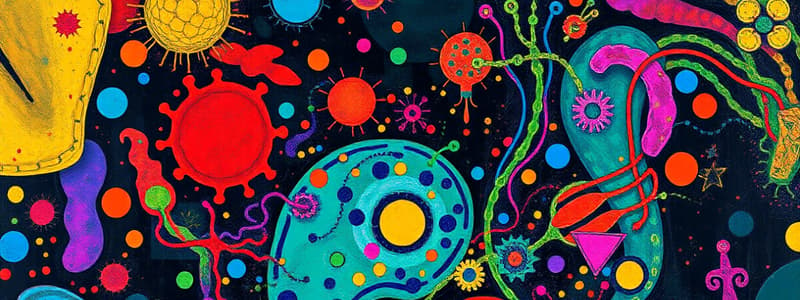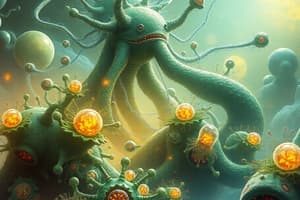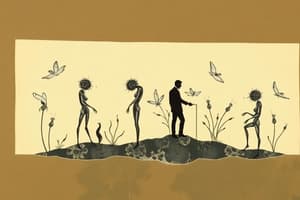Podcast
Questions and Answers
What is the primary focus of bacteriology?
What is the primary focus of bacteriology?
- Study of bacteria (correct)
- Study of viruses
- Study of helminths
- Study of fungi
What did Francisco Redi's experiments demonstrate regarding abiogenesis?
What did Francisco Redi's experiments demonstrate regarding abiogenesis?
- Germs come from air and not from spontaneous generation
- Life can spontaneously form from non-living matter
- Decaying meat comes from fly eggs (correct)
- Microorganisms grow in sterile broth regardless of exposure
What does the cell theory state?
What does the cell theory state?
- All cells only come from other cells (correct)
- Cells can be created from minerals
- Cells originate from viruses
- All cells can spontaneously generate
Which discovery is attributed to Robert Hooke?
Which discovery is attributed to Robert Hooke?
What was the main finding of Ignaz Semmelweis?
What was the main finding of Ignaz Semmelweis?
How did John Snow identify the source of the cholera outbreak?
How did John Snow identify the source of the cholera outbreak?
What solution did Joseph Lister propose to reduce postoperative infections?
What solution did Joseph Lister propose to reduce postoperative infections?
Which of these statements represents Koch's postulates?
Which of these statements represents Koch's postulates?
What is an exception to Koch’s postulates?
What is an exception to Koch’s postulates?
What is a modern focus of the germ theory of disease?
What is a modern focus of the germ theory of disease?
Flashcards are hidden until you start studying
Study Notes
Subfields of Microbiology
- Bacteriology: Focuses on the study of bacteria.
- Mycology: Involves the study of fungi.
- Protozoology: Centers on the study of protozoa.
- Parasitology: Examines helminths and other parasites.
- Virology: Concerns the study of viruses.
- Immunology: Investigates the immune system.
Abiogenesis and Experiments Against It
- Abiogenesis: The theory that life can spontaneously arise from non-living matter.
- Francisco Redi: Demonstrated that decaying meat did not produce maggots, which come from fly eggs, disproving abiogenesis.
- Louis Pasteur: Showed that microorganisms do not grow in sterilized broth unless exposed to air, further disproving abiogenesis.
- Differences: Redi used decaying meat to observe fly larva, while Pasteur focused on sterilized broth and microbial contamination.
Cell Theory
- Cell Theory: States that all cells arise from pre-existing cells, emphasizing the continuity of life.
Robert Hooke and Cell Discovery
- Hooke’s Discovery: Observed cork under a microscope and named the small structures “cells,” marking a significant milestone in microscopy.
Germ Theory
- Germ Theory of Disease: Proposes that many diseases stem from microbial infections.
Ignaz Semmelweis
- Key Finding: Introduced handwashing with lime solutions, significantly reducing childbirth mortality rates in Vienna General Hospital.
John Snow and Cholera
- Cholera Outbreak Investigation: Mapped cholera cases in 1848, identifying a contaminated water pump as the outbreak source.
Joseph Lister's Surgical Innovations
- Postoperative Infection Solution: Advocated using carbolic acid to disinfect wounds, reducing infection rates.
Florence Nightingale's Epidemiological Contribution
- Major Contribution: Utilized statistics to highlight preventable causes of death related to infections, sanitation, and hygiene.
Koch’s Postulates
- Four Postulates:
- The microbe must be found in all sick cases.
- It must be cultured outside the host.
- It must cause disease to a healthy organism of the same species.
- It must be reisolated from the experimental host.
Exceptions to Koch’s Postulates
- Microbes may not always be isolated outside the host.
- Some pathogens are linked to multiple diseases.
- Certain pathogens may only affect specific hosts.
Modern Focus of Germ Theory
- Investigates antibody resistance, new diseases, and diseases with multiple causative agents.
- Considers the mechanisms of various microbial agents involved in diseases.
Studying That Suits You
Use AI to generate personalized quizzes and flashcards to suit your learning preferences.




